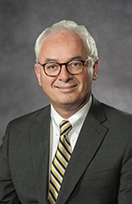Dear Colleagues-Friends:
One hundred years ago, when the School of Medicine was in its 80th year, the 1918 Influenza outbreak was an unprecedented health care pandemic. A century later, it is being remembered and recognized world-wide.
Last week, a lecture on this historical catastrophe was the latest installment in an ongoing important collaboration between the Virginia Museum of History and Culture and the MCV Foundation. Representing the two organizations were our hosts Mr. Jamie Bosket and Ms. Margaret Ann Bollmeier. The evening’s speakers outlined how far U.S. medicine has come in disease disaster management as well as the formative role of our School of Medicine both then and now.
Acclaimed author John M. Barry who studied the 1918 pandemic and wrote “The Great Influenza: The Story of the Deadliest Pandemic in History” set the stage, starkly describing the pandemic and its staggering impact world-wide. As his book notes, “at the height of World War I, history’s most lethal influenza virus erupted in an army camp in Kansas, moved east with American troops, then exploded, killing as many as 100 million people worldwide. It killed more people in 24 months than AIDS has killed in 24 years, more in a year than the Black Death killed in a century.”
Locally, a writer for the Richmond Times Dispatch in 1918 noted, “October has been pronounced the saddest month in the medical history of this nation…” MCV faculty and staff served the sick in emergency facilities set up in the city, and third- and fourth-year students served as assistants to physicians across the commonwealth. The pandemic had second and third waves that left MCV providing constant care throughout the winter of 1918-19. In spite of the efforts, thousands caught the flu and nearly 1,000 lost their lives, including three students and a much loved professor who’d gone to Chicago to care for an ailing family member. Our faculty and medical students gave valiantly to their city during the great pandemic and demonstrated the enduring value of this medical institution.
Today on the MCV Campus, we have continued to lead and innovate in infectious diseases, as evidenced by the recent recognition for VCU Health as one of 25 hospitals for its quality in infectious disease management.
Modern-day advances were highlighted during a panel discussion that featured Mr. Barry along with two of VCU’s present-day and nationally renowned leaders in infectious diseases, Dr. Gonzalo Bearman, chair of the Division of Infectious Diseases and associate hospital epidemiologist, and infectious disease physician Dr. Michael Donnenberg, who is senior associate dean for research and research training. The panelists addressed topics ranging from influenza’s changeability, to research on the protective factors of flu vaccines.
In addition, Dr. Bearman highlighted our Unique Pathogens Unit and its readiness to respond to infectious disease outbreaks like the Ebola crisis. And Dr. Donnenberg shared with the audience how one of our very first M.D.-Ph.D. alumni, Dr. Jeffery Taubenberger, is at the forefront of influenza vaccine development and actually discovered and sequenced the genome for the 1918 influenza virus. He noted cutting-edge studies led by medical school faculty, including the investigation of vitamin C’s potential to boost the body’s immune system and combat overwhelming infections. He also described urgent approaches to vaccine development. At the forefront are our researchers’ work in developing a vaccine for Lyme disease that is already available for animals and is now being considered for and under development for humans.
The audience responded in a lively discussion and, to round out the evening, MCV Foundation Chair Mr. Harry Thalhimer thanked Mr. Austin Brockenbrough III for his vision to establish a partnership between the Virginia Museum of History and Culture and the MCV Foundation that’s brought a fascinating series of lectures to the Richmond community. The series underscores what a great asset our academic medical center is, whether facing a moment of great need in 1918, or in serving as a resource every day since then. As highlighted in recent AAMC research, it’s this kind of service that the public depends on us for: medical innovation and research that makes America healthier and stronger.
Just as our faculty were on the front of the response to influenza in 1918, today VCU Health and the School of Medicine carry forward our mission of providing preeminent education to physicians and scientists in order to improve the quality of health care for all Virginians. We take great pride in our commitment to our community through our 180 years of service.
Thank you for your leadership.
With every good wish,
Peter F. Buckley, M.D.
Dean, VCU School of Medicine
Executive Vice President for Medical Affairs, VCU Health System